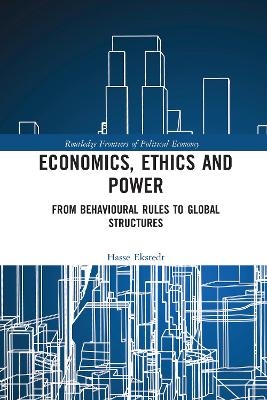
Economics, Ethics and Power
From Behavioural Rules to Global Structures
Seiten
2020
Routledge (Verlag)
978-0-367-58877-9 (ISBN)
Routledge (Verlag)
978-0-367-58877-9 (ISBN)
Drawing on Aristotle, Kant, Hume, and others, this book conceptualizes the analysis of ethics and economic and social structures. The book first considers the key philosophical underpinnings and categories which frame the discussion of ethics in economic theory and then considers individual ethics, social action, financial structures, and war.
Economic theory in its neoclassical form is sometimes regarded as free from values; it is simply the theory of economic exchange. This can only hold true if we accept the idea of "Homo Economicus" and the equilibrium economy. But in the real world, away from neoclassical models, there is no intrinsic stability as such. Instead, stability is created by the surrounding social, cultural and political structures. Clearly, it is imperative that ethics features in the analysis of these economic and socio-political structures.
Drawing on Aristotle, Kant, Hume and others, this book conceptualizes the analysis of ethics and economic and social structures. It first considers the key philosophical underpinnings and categories which frame the discussion of ethics in economic theory and then considers individual ethics, social action, financial structures and war. Throughout, ethics are examined in a multicultural context with structural complexities, and the difficulties in finding a coherent set of ethics which provides social cohesion and an open society are considered. A key part of this is the comparison of two ethical principles which can be adopted by societies: ius soli or loyalty to constitution, and ius sanguinis or loyalty to "Blood and Soil". The latter is argued to lead to problems of Us and the Other.
Introducing the possibility of integrating microscopic ethics into socio-political structures and proposing the eventual existence of a global ethics, this volume is a significant contribution to the emerging literature on economics, social structures and ethics. It will be of particular interest to those working in business and public administration and who have an education in socio-economic areas, but it also has a broad appeal to students and academics in the social sciences.
Economic theory in its neoclassical form is sometimes regarded as free from values; it is simply the theory of economic exchange. This can only hold true if we accept the idea of "Homo Economicus" and the equilibrium economy. But in the real world, away from neoclassical models, there is no intrinsic stability as such. Instead, stability is created by the surrounding social, cultural and political structures. Clearly, it is imperative that ethics features in the analysis of these economic and socio-political structures.
Drawing on Aristotle, Kant, Hume and others, this book conceptualizes the analysis of ethics and economic and social structures. It first considers the key philosophical underpinnings and categories which frame the discussion of ethics in economic theory and then considers individual ethics, social action, financial structures and war. Throughout, ethics are examined in a multicultural context with structural complexities, and the difficulties in finding a coherent set of ethics which provides social cohesion and an open society are considered. A key part of this is the comparison of two ethical principles which can be adopted by societies: ius soli or loyalty to constitution, and ius sanguinis or loyalty to "Blood and Soil". The latter is argued to lead to problems of Us and the Other.
Introducing the possibility of integrating microscopic ethics into socio-political structures and proposing the eventual existence of a global ethics, this volume is a significant contribution to the emerging literature on economics, social structures and ethics. It will be of particular interest to those working in business and public administration and who have an education in socio-economic areas, but it also has a broad appeal to students and academics in the social sciences.
Hasse Ekstedt is a Senior Researcher at the School of Public Administration at the University of Gothenburg, Sweden.
Acknowledgement, List of figures, List of tables. Introduction. Prologue. 1. Ethics in Philosophy. 2. Philosophy and Economics of the Modern World. 3. Economics and Ethics in Economic Theory: Action and Remorse. 4. Faith and Axiomatic Structures. 5. Collective Ethics and Forms of Government/Governance. 6. Money, Financial Structures and Ethics. 7. The Other and Collective Social Action. 8. War. Conclusions and Epilogue. Index
| Erscheinungsdatum | 01.07.2020 |
|---|---|
| Reihe/Serie | Routledge Frontiers of Political Economy |
| Verlagsort | London |
| Sprache | englisch |
| Maße | 156 x 234 mm |
| Gewicht | 453 g |
| Themenwelt | Geschichte ► Teilgebiete der Geschichte ► Wirtschaftsgeschichte |
| Wirtschaft ► Allgemeines / Lexika | |
| Wirtschaft ► Volkswirtschaftslehre ► Wirtschaftspolitik | |
| ISBN-10 | 0-367-58877-3 / 0367588773 |
| ISBN-13 | 978-0-367-58877-9 / 9780367588779 |
| Zustand | Neuware |
| Informationen gemäß Produktsicherheitsverordnung (GPSR) | |
| Haben Sie eine Frage zum Produkt? |
Mehr entdecken
aus dem Bereich
aus dem Bereich
Macht und Herrschaft im Zarenreich
Buch | Hardcover (2024)
C.H.Beck (Verlag)
49,90 €


